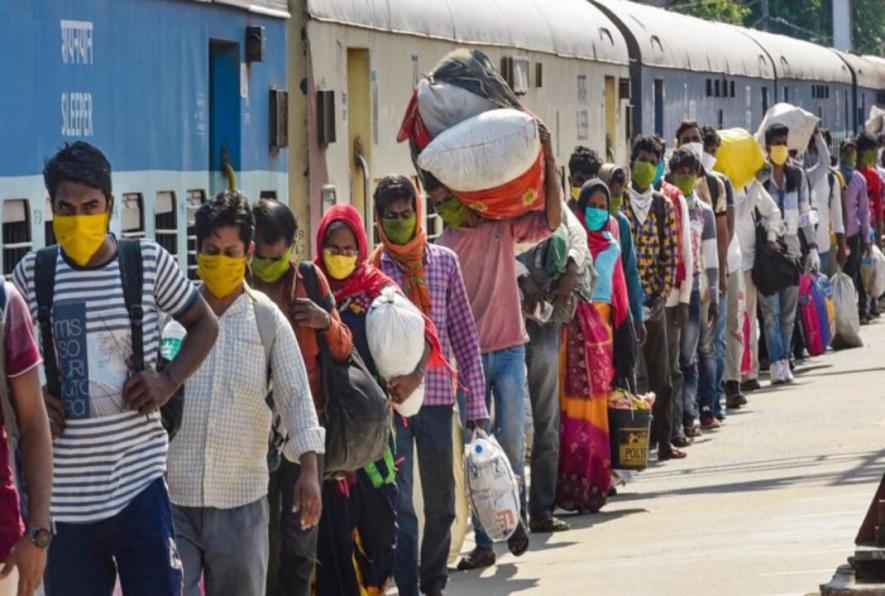COVID-19: K’taka Govt Agrees to Resume Trains for Migrant Workers After Trade Unions Accuse State of Enforcing Forced Labour

The BJP-led Karnataka government has agreed to resume the train services scheduled to return migrant workers back to their native villages, after delegates representing 10 central unions registered their protest in a meeting yesterday with the state government’s Labour Minister Shivram Hebbar.
This Joint Committee of Trade Unions (JCTU), comprising almost all central trade unions except the ruling Bharatiya Janata Party affiliated Bharatiya Mazdoor Sangh, submitted to Hebbar a letter addressing Chief Minister B.S. Yediyurappa, calling on the state government to resume the train services.
The letter pointed out that the government’s decision to stop these trains in order to hold back the migrant workers in Bangalore city against their will, at the insistence of the real estate lobby who are seeking cheap labour, amounted to a blatant violation of Article 23 of the Constitution which prohibits forced labour.
The Labour Minister has conceded to their demands and assured the JCTU that the services will be resumed within two days.
These "Shramik Special Trains" to ferry the migrant workers stranded in different parts of the country back to their homes have been running since May Day, following a directive from the central government’s Ministry of Home Affairs.
This directive was issued after the central government and several state governments came under enormous criticism by trade unions and other organisations for its mishandling of the lockdown.
Hundreds of thousands of migrant labourers, stranded without food and money for over a month under the lockdown, have on multiple occasions been forced out to the streets en masse in a desperate bid to make it back to their villages.
With tens of thousands scrambling to get a seat aboard these trains, the Karnataka government had stopped the service from May 5, after CM Yeddyurappa held a meeting with the representatives of Confederation of Real Estate Developers Associations of India (CREDAI).
At the meeting, the influential association, representing giants in the construction industry, had reportedly complained to the CM that the continuation of this service will lead to a shortage of the labour to complete their projects and cash-in the sales of properties on time. This is because the banks generally release the loans - applied for by the customers buying these properties from builders - after the registration, following the completion of at least 80% of the construction, Meenakshi Sundaram, general secretary of the state Centre of Indian Trade Unions (CITU), explained to NewsClick.
Usually construction activity in Bangalore reaches a feverish pace at the peak of summer in March and April, and is completed before the onset of monsoon. However, the lockdown imposed to contain COVID-19 had brought work at the construction sites to a halt this season. An exodus of cheap labour from the city at this time, when a large number of projects are yet to reach 80% completion, will make it difficult for the builders to turn their investments into profits within the coming few months.
“They are not concerned about the local workers heading back to their native villages within Karnataka,” Sundaram said, adding, “But the construction workers hailing from Bihar provide labour cheaply, and are available at the builders' disposal 24 hours a day. So they want to retain them.”
While none of the unions have raised any objection to employing migrant workers who want to voluntarily stay back for work, holding them in the city against their will amounts to an enforcement of forced labour at the behest of the real estate lobby. It is also a violation of freedom of movement envisioned in Article 19(1)(d) of the Constitution, the letter to C.M pointed out.
“These are people who have come to work in Bangalore.. Once there is employment, normalcy will get established… so why go back then?,” N. Manjunath Prasad, the nodal officer for interstate travel from Karnataka, had said in an insensitive comment after instructing the South Western Railway to cancel the service. “Those who still want to go back,” he had further added, “can do so using their own vehicle.”
Also read: COVID-19: Patient Commits Suicide, Death Toll Reaches 20 in Karnataka
However, few of them are in a position to afford "their own vehicle". The trade unions pointed out in the letter that amid the lockdown, "64% of migrant workers are left with less than Rs. 100… Only 6% of them (have) received full wages…. and only one in five received rations. The Central and State Governments have failed to ensure payment of wages, food, financial and tenure security during lockdown, thereby stripping the workers of rights to dignity and food."
The same builders and contractors, who are now reportedly lobbying the government to hold back these workers in the city against their will, had "completely abandoned the workers leaving them to scrounge for food and money".
Adding to this precariousness of their situation, many have been harassed by landlords and owners of slums with threats of evictions as they have no money to pay rents during the lockdown. Many have also been subjected to police brutality.
"Dramatic scenes of thousands of workers walking long distances and queuing up to get registered to leave Bengaluru.. to their home states demonstrate their unwillingness to continue in such a hostile environment," the letter said, adding, "It is symbolic of their crushed dignity."
The Karnataka government's cancellation of the trains scheduled to aid these migrants who have endured "such deep physical, emotional, and psychological trauma" amounts to "the worst assault on the workers whose labour has contributed immensely to Karnataka’s flourishing," the unions stated.
Also read: Modi Government is on a Dangerous Course
Get the latest reports & analysis with people's perspective on Protests, movements & deep analytical videos, discussions of the current affairs in your Telegram app. Subscribe to NewsClick's Telegram channel & get Real-Time updates on stories, as they get published on our website.























